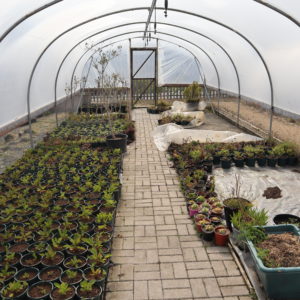
Cumbria, Northumberland, Tyne and Wear NHS Foundation Trust (CNTW), a provider of mental health and disability services across the North of England, is marking NHS Sustainability Day today (17 September) and committing to reduce its carbon emissions to net zero by 2040.
Through its new CNTWClimateHealth sustainability programme, the Trust is developing a comprehensive plan to reduce its carbon emissions to net zero by 2040,* minimise waste, develop sustainable models of care and maximise the use of green spaces on its sites to support therapeutic activities and enhance biodiversity.
The NHS overall is estimated to be responsible for around five percent of all UK carbon emissions[i] and five percent of all journeys on UK roads are estimated to be healthcare-related.[ii] In 2018-19 the carbon footprint of our Trust was equivalent to around 26,500 tonnes of carbon dioxide per year.[iii]
The Trust has already taken some steps to reduce waste and lower emissions, but we have big plans to come. We are building a network of staff to share ideas and develop local action plans, and this engagement will also be extended to gather input from people who use our services.
Anna FosterDeputy Director of Commissioning and Quality Assurance and Lead for Sustainability
In April this year the Trust switched to purchasing 100% renewable energy, and recently the Trust’s Pharmacy team in Newcastle became trailblazers within the organisation when they switched to using an electric vehicle as their pool car. Today, on NHS Sustainability Day, the Trust is also announcing that it hopes to increase the range of vegetarian and vegan options in their catering provision, remove single-use plastics from cafes and canteens within six months, source more catering supplies from local food producers, and review ways to encourage more cycling including better cycle parking provision and clearly mapped cycle routes between Trust sites where suitable.
Trust staff and service users will also be planting several new trees around hospital grounds on NHS Sustainability Day, with plans to plant more this autumn (the ideal time of year to plant young trees).

To mark the day, staff across the organisation will also be taking part in interactive virtual sessions to explore how the Trust can become more sustainable. These sessions will cover practical topics such as helping patients to take up cycling, and how the Trust can protect and maximise the many green spaces across its sites (which are known to offer significant mental health benefits).
The Trust is also encouraging staff to take to social media and share their pledges to support the CNTWClimateHealth initiative, with simple actions such as turning electronic equipment off overnight to reduce energy consumption. (Find out more on Twitter at @CntwH.)
Acknowledging the impact of coronavirus on the Trust’s plans, Anna Foster added: “Though the COVID-19 pandemic has been a huge challenge for our organisation and the people we support, in many ways it has helped us to become much more ambitious about what changes we can achieve.
“The pandemic has really accelerated the adoption of technology such as Microsoft Teams across our organisation, enabling us to move many teams to remote- or home-working to ensure continued support and treatment for people through telephone and video-call contact.
“In an organisation which spans a huge area, from Whitehaven to Newcastle up to Berwick and down to Sunderland, many staff have found the time and travel saved by virtually meeting colleague and teams a revelation. During the height of the ‘lockdown’ restrictions the reduction we saw in carbon emissions was the equivalent of planting 118 trees.

“We know the importance of face-to-face, in-person contact for many of our service users living in the community, and most of our teams have been able to return to offering this using the appropriate PPE and safety precautions. During the pandemic, we have had to find new virtual ways of working, which means we are now able to offer people a greater choice of consultation and treatment options to suit their needs while also reducing our emissions.”
With climate change labelled the greatest threat to health in the 21st century by medical journal The Lancet,[iv] in March CNTW’s Board joined a growing number of NHS organisations who have responded to pressing environmental issues by declaring a ‘climate and ecological emergency’.
Climate and ecological change is likely to negatively affect the physical and mental health of the UK population, and we recognise our responsibility to deliver our services in a sustainable way which meets the needs of the people who need our services today, while minimising harm to future generations.
As a mental health and disability services provider we support some of the most vulnerable people in society, and we are aware that the use of language such as ‘climate emergency’ or ‘climate crisis’ could cause anxiety or distress to those we serve – especially in conjunction with anxiety around the global pandemic which we have been living with throughout this year. We will try to ease this wherever possible; we believe that by focussing on hope and opportunities for change and recovery, in line with our Trust’s core values, together we can make a positive impact.
Ken Jarrold CBEChair of the Council of Governors and Board of Directors at CNTW
*Carbon neutrality in this instance refers to direct emissions from those activities owned or controlled by CNTW, indirect emissions associated with the consumption of electricity, and emissions from ‘greyfleet’ (where staff use their own cars for business use). CNTW’s Green Plan and Vision documents will be released later this year.
References:
[i] Health Care Climate Footprint Report 2019
[ii] NHS Sustainable Development Unit Carbon hotspots – travel
[iii] NTW 2018-19 Annual Report and Accounts
[iv] The Lancet, Managing the Health Effects of Climate Change 2009
